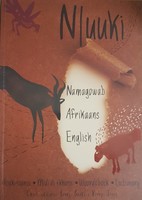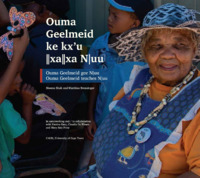-

N|uuki, Namagowab, Afrikaans, English : ‡Xoaki‡xanisi, Mîdi di ‡Khanis, Woordeboek, Dictionary
This dictionary features two dialects of the N|uu language (Eastern and Western), as well as Nama, Afrikaans and South African English. This dictionary was not simply translated in standard varieties of Nama and Afrikaans, but was based on fieldwork conducted with speakers of these languages living in previously N|uu-speaking areas, i.e., South African Nama and 'Onse Afrikaans'. These languages and dialects show evidence of their influence on one another over time.
-
Working in a Community : Case study: N/uu / N//ng
The "Case study: N/uu / N//ng" is a chapter in "Language Endangerment" edited by David Bradley and Maya Bradley. The book address the topic language endangerment through the lens of the disastrous consequence of reducing the variety of human knowledge and thought. It shows why it matters, why and how it happens, and what communities and scholars can do about it. The "Case study: N/uu / N//ng" is the book's third chapter and focusses on the #Komani people and their N!uu language which is close to extinction. Publisher Summary: Ethical research is not just a moral obligation, inappropriate behaviour is unacceptable. It can have bad consequences for a community and for later researchers; no one welcomes the eleventh nerd. Communities and individuals within them have priorities, and they usually do not include spending time with an outsider whose future intentions and use of the material collected are unknown. They often suspect that researchers wish to benefit financially from what is collected; and in truth nearly all researchers do wish to benefit, at least in terms of advancing their academic discipline and their own career. It is wise to have a truthful and understandable reason why you want to do your research in a particular place which you can explain to people.
-

Ouma Geelmeid ke kx’u //xa//xa N/uu
Three sisters living near Upington in the Northern Cape province of South Africa are the last fluent speakers of Nǀuu. Linguists from the Centre for African Language Diversity (CALDi) at UCT produced an illustrated 160 page trilingual Nǀuu-Afrikaans-English reader in collaboration with community members to support revitalisation efforts of this highly endangered language. The hard copies of the reader are used in the Nǀuu language classes conducted by Ouma Geelmeid, the youngest of the three Nǀuu-speaking sisters. The reader features twelve thematic areas with phrases and sentences derived from everyday conversations, as well as games, prayers and songs taught by Ouma Geelmeid. Core cultural terms and basic vocabulary used in the Nǀuu language classes have been compiled in Nǀuu-Afrikaans-English and Afrikaans-Nǀuu-English glossaries. In addition, new Nǀuu language data is available to a wider audience, both academics and other interested parties, through the electronic online copy of the reader. This language data will be of particular interest to scholars working in a number of subfields of linguistics, including typology, historical linguistics and language contact studies.
for
San tsî Khoen Digital Archive ǂoaba ǂans
Khomani language



